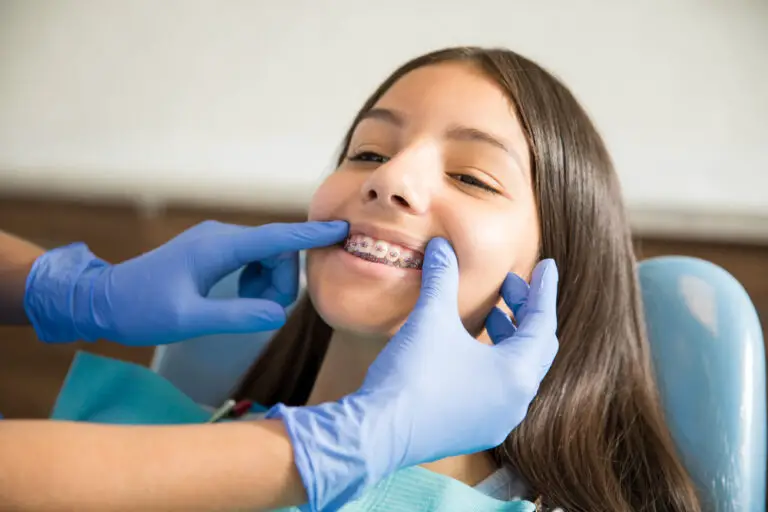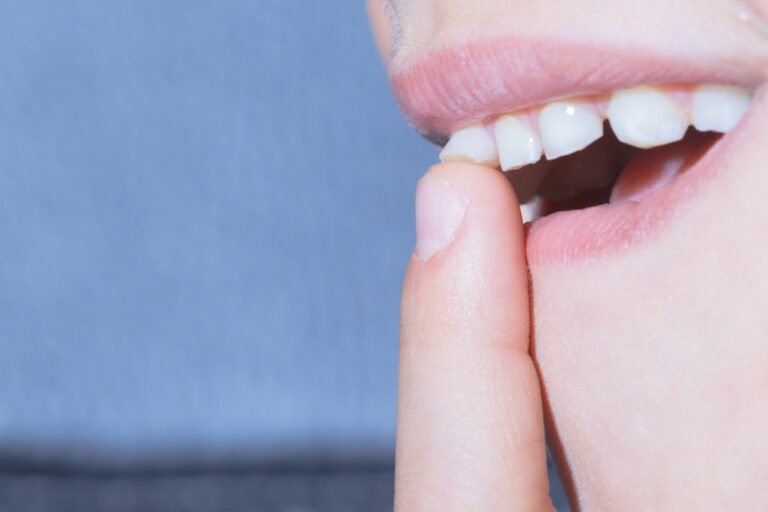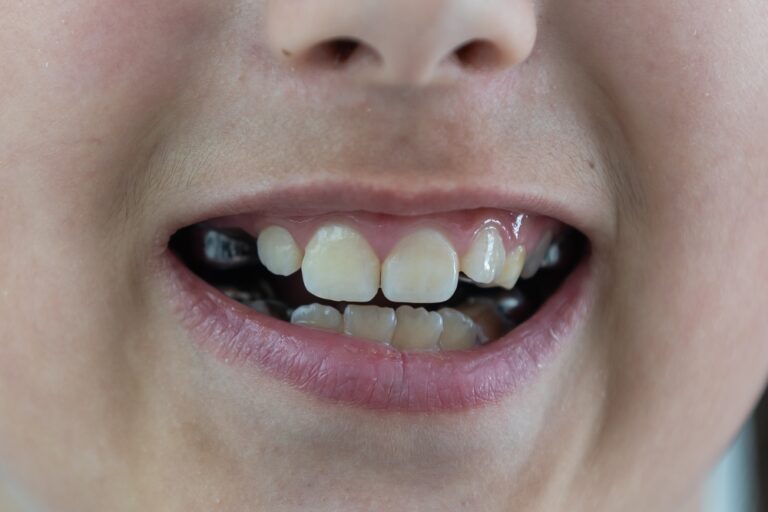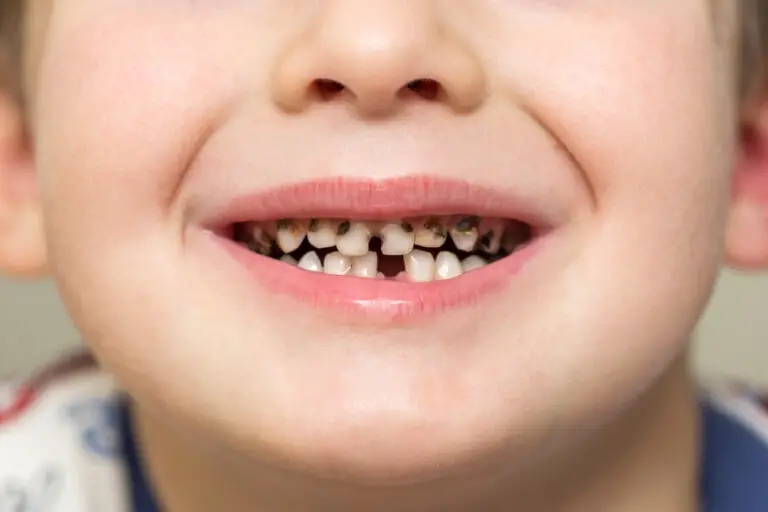If you’re a breastfeeding mother who’s looking to whiten your teeth, you may be wondering whether it’s safe to use hydrogen peroxide. Hydrogen peroxide is a common ingredient in many teeth whitening products, and it’s known for its ability to remove stains and brighten teeth. However, as a breastfeeding mother, you need to be careful about what you put in your body, as certain substances can pass through your breast milk and affect your baby’s health.
The good news is that hydrogen peroxide is generally considered safe to use while breastfeeding. According to experts, the amount of hydrogen peroxide that’s absorbed into your body when you whiten your teeth is minimal, and it’s unlikely to harm your baby. However, it’s important to note that there are some risks associated with using hydrogen peroxide, such as tooth sensitivity and gum irritation. If you’re concerned about these side effects, you may want to talk to your dentist before using any teeth whitening products.
In general, it’s best to avoid using any teeth whitening products while you’re breastfeeding, as there’s not enough research to determine their safety. Instead, you may want to try some natural teeth whitening remedies, such as brushing with baking soda or using a mixture of lemon juice and salt. These remedies are safe for breastfeeding mothers and won’t harm your baby. If you’re unsure about what’s safe and what’s not, it’s always a good idea to consult with your doctor or a lactation consultant.
Understanding Hydrogen Peroxide
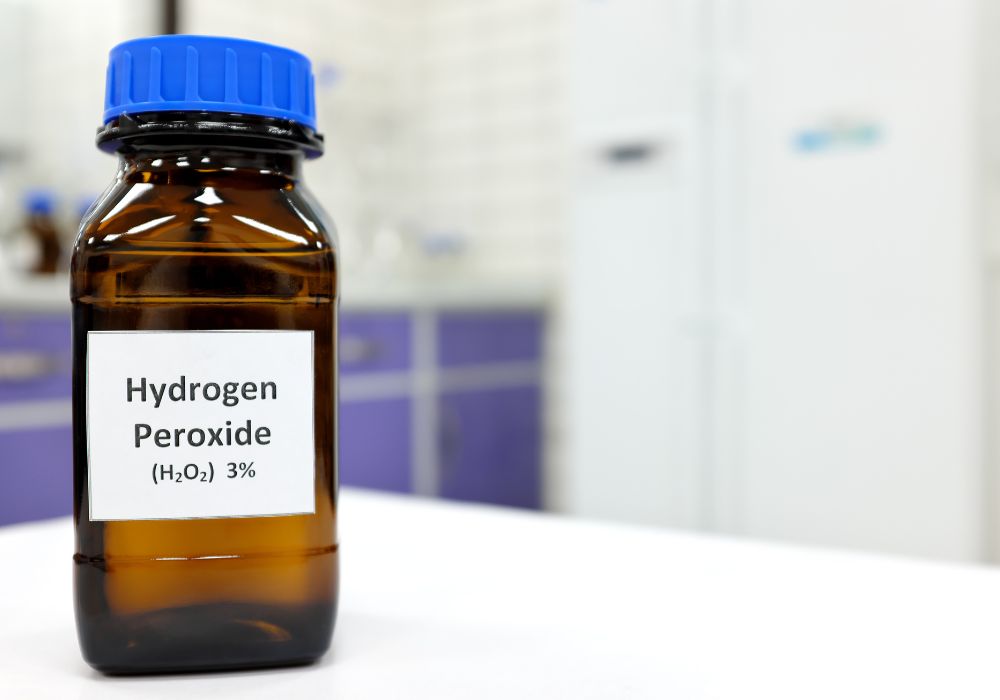
Hydrogen peroxide is a chemical compound that is commonly used as a disinfectant and bleaching agent. It is also used in teeth whitening products. Hydrogen peroxide is a colorless liquid that can be found in various concentrations. In teeth whitening products, it is usually found in concentrations ranging from 10% to 35%.
When hydrogen peroxide comes into contact with the teeth, it breaks down into water and oxygen molecules. The oxygen molecules then enter the enamel and dentin of the teeth, breaking down the stains and discolorations on the surface. This process is known as oxidation.
While hydrogen peroxide is generally safe to use on teeth, it can be harmful if used in excessive amounts or for prolonged periods. High concentrations of hydrogen peroxide can cause tooth sensitivity and damage to the enamel and gums. It is important to follow the instructions provided with the teeth whitening product and to consult with a dentist before using hydrogen peroxide on your teeth.
When using hydrogen peroxide on your teeth, it is important to use it in moderation and to avoid swallowing it. Swallowing hydrogen peroxide can cause nausea, vomiting, and even chemical burns in the throat and stomach. If you accidentally swallow hydrogen peroxide, seek medical attention immediately.
In conclusion, hydrogen peroxide can be an effective teeth whitening agent when used properly. However, it is important to use it in moderation and to follow the instructions provided with the product. Consult with a dentist before using hydrogen peroxide on your teeth, especially if you are pregnant or breastfeeding.
Effects of Hydrogen Peroxide on Teeth
Hydrogen peroxide is a commonly used teeth whitening agent that can be found in many over-the-counter whitening products. It works by breaking down stains on the teeth and removing them, making the teeth appear whiter.
However, using hydrogen peroxide on your teeth can also have some negative effects. Here are some potential effects to be aware of:
- Tooth sensitivity: Hydrogen peroxide can cause tooth sensitivity, especially when used in high concentrations or for long periods of time. This sensitivity can be temporary or permanent, depending on the severity of the exposure.
- Enamel damage: Prolonged exposure to hydrogen peroxide can also damage the enamel on your teeth. Enamel is the protective layer on the outside of your teeth, and if it becomes damaged, it can lead to tooth decay and other dental problems.
- Gum irritation: Hydrogen peroxide can also irritate your gums if it comes into contact with them. This can cause redness, swelling, and discomfort.
To minimize these potential effects, it’s important to use hydrogen peroxide on your teeth in moderation and according to the instructions on the product label. It’s also a good idea to speak with your dentist before using any whitening products to make sure they’re safe for your teeth and overall oral health.
Breastfeeding and Oral Health Care
As a new mother, taking care of your oral health is important, especially if you are breastfeeding. Here are some tips to help you maintain good oral hygiene:
- Brush your teeth twice a day with fluoride toothpaste. Brushing your teeth helps remove plaque and bacteria that can cause tooth decay and gum disease. Use a soft-bristled toothbrush and fluoride toothpaste to help strengthen your teeth.
- Floss daily. Flossing helps remove food particles and plaque from between your teeth and along the gum line, where your toothbrush can’t reach.
- Use mouthwash. Mouthwash can help kill bacteria and freshen your breath. However, not all mouthwashes are safe to use while breastfeeding. Avoid mouthwashes that contain alcohol, as they can be absorbed into your bloodstream and passed to your baby through breast milk.
- Avoid sugary and acidic foods and drinks. Eating a balanced diet that is low in sugar and acidic foods can help prevent tooth decay and gum disease. Limit your intake of sugary drinks such as soda, sports drinks, and fruit juices.
- Visit your dentist regularly. Regular dental checkups and cleanings can help prevent tooth decay and gum disease. Let your dentist know that you are breastfeeding so they can provide you with safe and effective treatment options.
Can you use hydrogen peroxide on your teeth while breastfeeding? While there is no definitive answer, it is generally recommended that you avoid using hydrogen peroxide on your teeth while breastfeeding. There have been no studies conducted on the safety of hydrogen peroxide use during breastfeeding, and it is not clear whether it can be absorbed into breast milk. Therefore, it is best to err on the side of caution and avoid using hydrogen peroxide on your teeth while breastfeeding.
Hydrogen Peroxide and Breastfeeding

If you’re considering using hydrogen peroxide to whiten your teeth while breastfeeding, you may be wondering if it’s safe for you and your baby. Hydrogen peroxide is a common ingredient in many teeth whitening products, and it’s important to understand its potential risks and benefits before using it.
According to the e-lactancia database, hydrogen peroxide is considered a low-risk drug for breastfeeding mothers. This means that it’s generally safe to use in small amounts, but you should still exercise caution and follow your doctor’s recommendations.
While there are no studies specifically on the use of hydrogen peroxide for teeth whitening during breastfeeding, it’s important to note that excessive use of hydrogen peroxide can cause irritation and damage to your gums and teeth. This is why it’s recommended that you avoid getting excess amounts of the product on your gums as much as possible.
If you do choose to use hydrogen peroxide for teeth whitening while breastfeeding, be sure to follow the instructions carefully and use it in moderation. It’s also a good idea to talk to your dentist or doctor before using any teeth whitening products to ensure that they are safe for you and your baby.
In summary, while hydrogen peroxide is generally considered safe for breastfeeding mothers, it’s important to use it in moderation and follow your doctor’s recommendations. If you have any concerns about using hydrogen peroxide or any other teeth whitening products while breastfeeding, be sure to talk to your healthcare provider.
Safety Measures
If you are considering using hydrogen peroxide on your teeth while breastfeeding, it is important to take some safety measures to ensure the health and safety of both you and your baby. Here are some tips to keep in mind:
1. Consult with your dentist
Before using any teeth whitening product, it is always a good idea to consult with your dentist first. They can provide you with professional advice on whether or not it is safe to use hydrogen peroxide while breastfeeding. Additionally, they can recommend alternative treatments that are safe for you and your baby.
2. Use a low concentration
If you do decide to use hydrogen peroxide, it is important to use a low concentration. Studies show that concentrations lower than 2% won’t damage hard or soft oral tissues. Using a higher concentration can lead to gum irritation and tooth sensitivity. Be sure to read the label carefully and follow the instructions provided.
3. Avoid swallowing
While using hydrogen peroxide, it is important to avoid swallowing any of the solution. Swallowing hydrogen peroxide can cause nausea, vomiting, and even chemical burns in the mouth and throat. Be sure to spit out any excess solution and rinse your mouth thoroughly with water.
4. Limit use
It is recommended to limit the use of hydrogen peroxide to once or twice a week. Overuse can lead to tooth sensitivity and gum irritation. Additionally, it is important to wait at least 24 hours between treatments.
5. Consider alternative treatments
If you are unsure about using hydrogen peroxide while breastfeeding, there are alternative treatments available that are safe for you and your baby. These include whitening toothpaste, dental bonding, and porcelain veneers.
By following these safety measures, you can safely use hydrogen peroxide on your teeth while breastfeeding. However, it is always a good idea to consult with your dentist first to determine the best course of action for you and your baby.
Alternatives to Hydrogen Peroxide
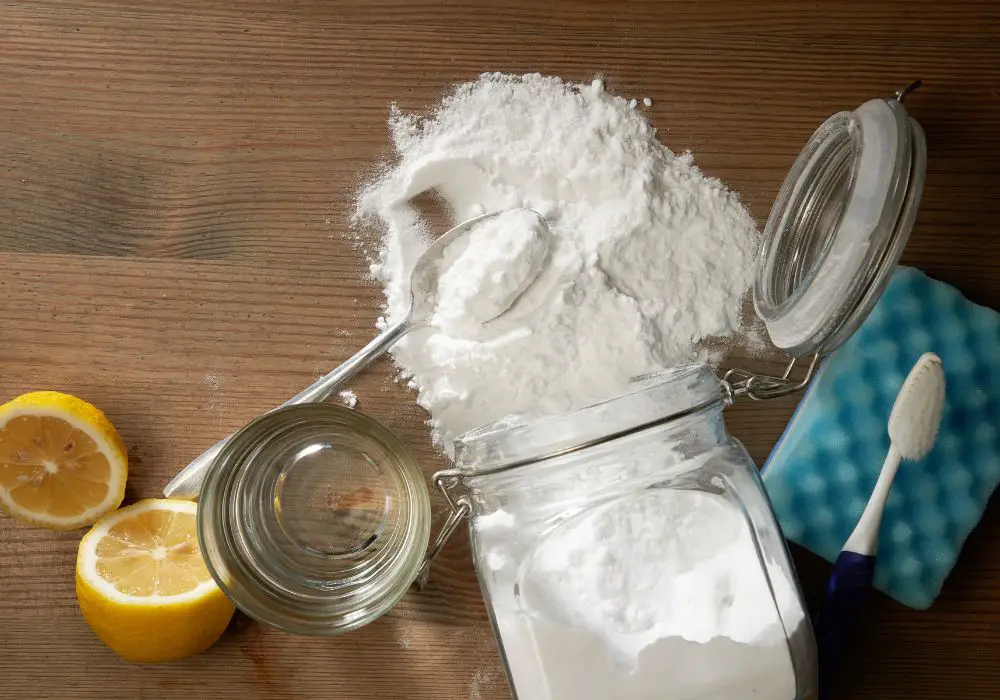
If you are looking for alternatives to hydrogen peroxide for teeth whitening or mouthwash, there are several options available. Here are some of the most popular alternatives:
Baking Soda
Baking soda is a natural teeth whitener that has been used for generations. It is mildly abrasive, which helps to remove surface stains from teeth. To use baking soda, simply mix a small amount with water to form a paste, then brush your teeth with the paste for two minutes.
Coconut Oil
Coconut oil is a popular alternative to mouthwash. It has natural antibacterial properties that can help to kill harmful bacteria in the mouth. To use coconut oil as a mouthwash, simply swish a tablespoon of coconut oil in your mouth for 10-15 minutes, then spit it out.
Activated Charcoal
Activated charcoal is a natural teeth whitener that works by absorbing surface stains from teeth. To use activated charcoal, simply wet your toothbrush, dip it in the charcoal powder, then brush your teeth for two minutes. Be sure to rinse your mouth thoroughly after brushing.
Apple Cider Vinegar
Apple cider vinegar is a natural mouthwash that can help to kill harmful bacteria in the mouth. To use apple cider vinegar as a mouthwash, simply mix a tablespoon of apple cider vinegar with a cup of water, then swish the mixture in your mouth for 30 seconds.
Tea Tree Oil
Tea tree oil is a natural antibacterial agent that can help to kill harmful bacteria in the mouth. To use tea tree oil as a mouthwash, simply add a few drops of tea tree oil to a cup of water, then swish the mixture in your mouth for 30 seconds.
Table Salt
Table salt is a natural teeth whitener that works by removing surface stains from teeth. To use table salt, simply mix a small amount with water to form a paste, then brush your teeth with the paste for two minutes.
These alternatives to hydrogen peroxide are safe and effective for teeth whitening and oral hygiene. However, it’s important to note that none of these options should be used as a replacement for regular brushing and flossing. If you have any concerns about your oral health, be sure to consult with your dentist.
Frequently Asked Questions
Is it safe to use hydrogen peroxide on teeth while breastfeeding?
The safety of using hydrogen peroxide on teeth while breastfeeding is still uncertain. While there are no conclusive studies that show the negative effects of hydrogen peroxide on breast milk, it is better to err on the side of caution and avoid using it during breastfeeding.
Are there any alternatives to hydrogen peroxide for teeth whitening while breastfeeding?
Yes, there are several alternatives to hydrogen peroxide for teeth whitening while breastfeeding. Some safe options include baking soda, activated charcoal, and coconut oil pulling.
Can teeth whitening products affect breast milk?
There is no conclusive evidence that teeth whitening products affect breast milk. However, it is better to avoid using any products that contain harsh chemicals or unknown ingredients during breastfeeding.
Is Kor whitening safe to use while breastfeeding?
Kor whitening is not recommended for use while breastfeeding. It contains hydrogen peroxide, which can potentially be harmful to breast milk.
Can you get your teeth professionally whitened while breastfeeding?
It is not recommended to get your teeth professionally whitened while breastfeeding. The chemicals used in professional teeth whitening procedures can potentially harm breast milk.
What teeth whitening options are safe for breastfeeding mothers?
Safe teeth whitening options for breastfeeding mothers include natural remedies such as baking soda, activated charcoal, and coconut oil pulling. It is also recommended to consult with your dentist before using any teeth whitening products during breastfeeding.

